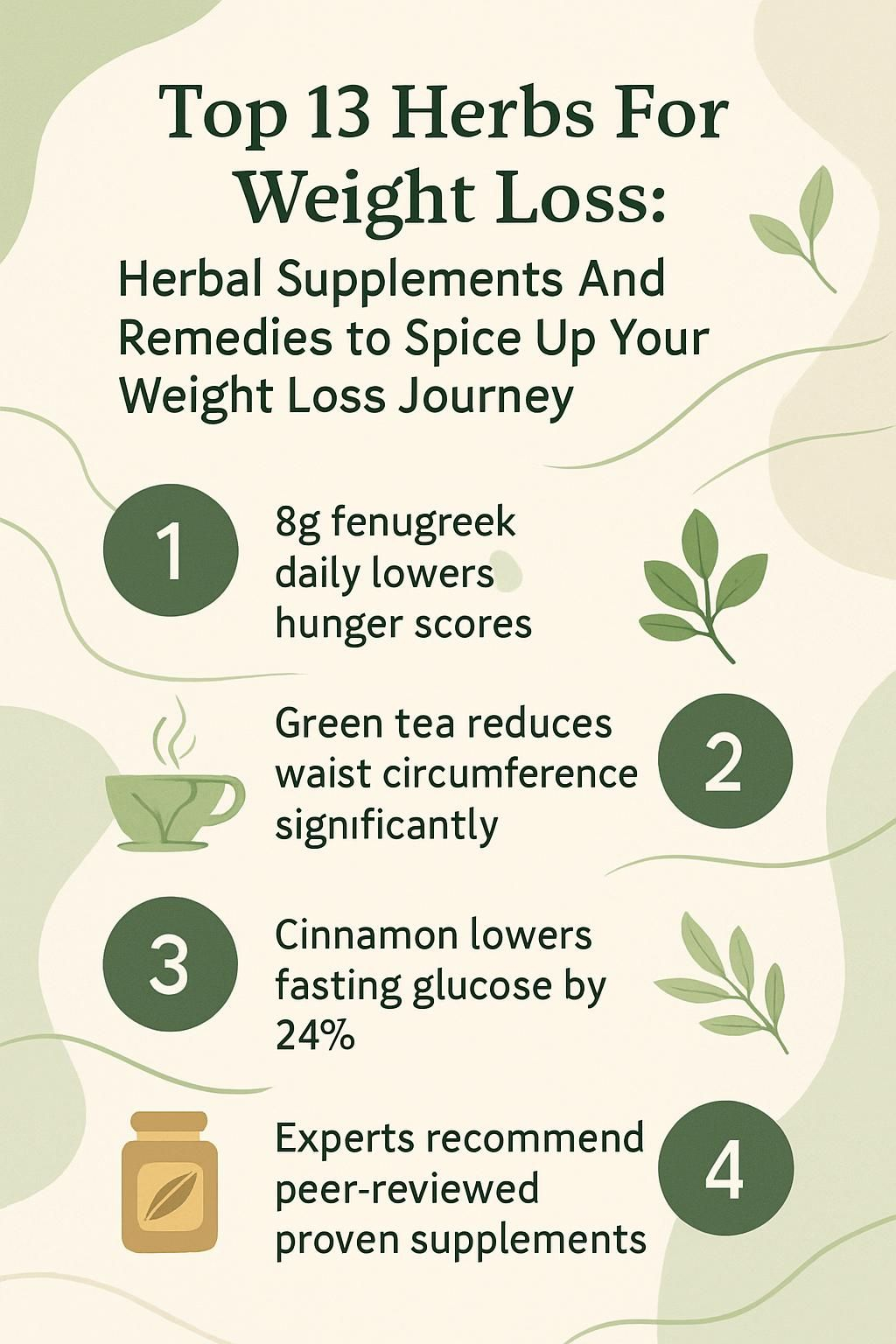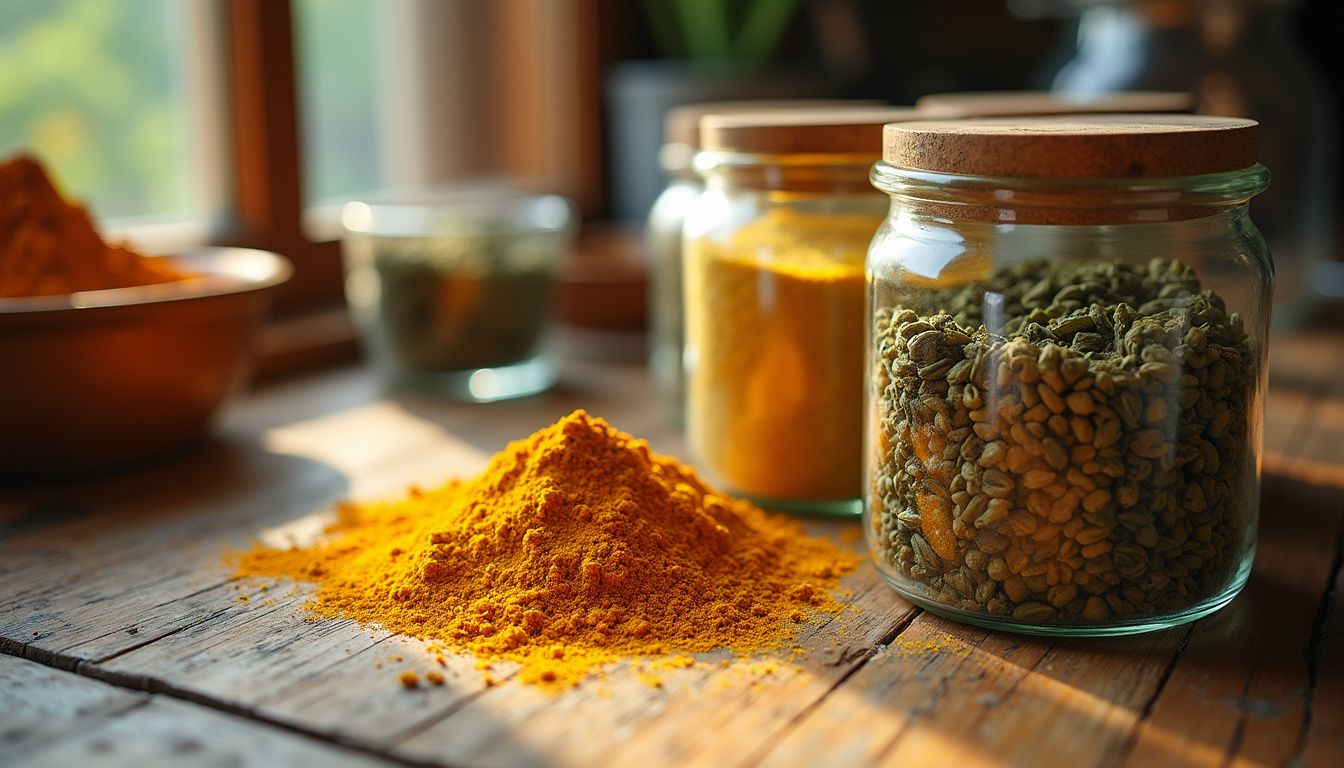Top 13 Herbs For Weight Loss: Herbal Supplements And Remedies To Spice Up Your Weight Loss Journey
Our Nutrition Assistant AI Suite will transform your body. You will lose fat, get toned, and build muscle. Gain confidence and optimal health.
If losing weight feels slow or frustrating, you are not alone. Many people look for safe, natural ways to support their plan. Research suggests certain herbs and spices can help you lose weight by nudging metabolism, appetite, and fluid balance.
This guide reviews 13 herbs for weight loss with evidence from clinical trials, including green tea, turmeric, fenugreek, and more. You will see what the science says, how to use them, and where they may fit in your day. The goal is to help you pick simple steps that move you closer to your weight loss goals.
Keep reading to find easy, science-backed ideas you can add to meals, teas, or supplements.
Key Takeaways
- Green tea extract, cayenne pepper, and ginger can raise calorie burn. A 2019 meta-analysis found green tea reduced body weight and waist size compared with placebo.
- Fenugreek’s fiber, called galactomannan, increases fullness. In a placebo-controlled trial, 8 grams per day reduced hunger scores.
- Caralluma fimbriata and Gymnema sylvestre may ease cravings. Trials report lower calorie intake and less appeal of sweets.
- Curcumin in turmeric supports fat metabolism and lowers inflammation. Cinnamon can reduce fasting blood sugar in people with type 2 diabetes.
- Choose high-quality products, check doses, and talk with a healthcare provider before starting any supplement.

How Herbs Can Support Weight Loss

Many herbs and spices offer small, helpful boosts that add up over time. Studies link select herbal remedies with changes in metabolism, appetite signals, and how the body stores fat. These shifts are modest, yet useful alongside diet and exercise.
How do herbs boost metabolism?
Some herbs help you burn a few more calories each day. Green tea, cayenne pepper, ginger, ginseng, and cumin are often studied. Capsaicin, the spicy compound in chili peppers, gently raises body temperature, a process called thermogenesis. That can increase energy use, even at rest.
A 2019 systematic review and meta-analysis reported that green tea extract led to greater drops in weight and waist circumference than placebo. Ginger supports digestion and may activate brown fat, which burns calories for heat. Turmeric’s curcumin can calm inflammation, a factor tied to slower metabolism in obesity.
These effects are usually modest, yet they can support healthy weight management without prescription drugs.
Can herbs help suppress appetite?
Yes, certain herbs may help you feel full on fewer calories. Caralluma fimbriata targets brain pathways linked to hunger and has reduced appetite in randomized controlled trials. Gymnema sylvestre can blunt sweetness on the tongue for 30 to 60 minutes, which often reduces the pull of desserts.
Fenugreek seeds are high in soluble fiber, which swells with water and slows stomach emptying. Many people eat less at the next meal after using it. Caffeine and polyphenols in green tea and green coffee extracts may also lower perceived hunger for some users.
Study results show small to moderate effects. Use them to support, not replace, steady meal planning and protein-rich foods that keep you satisfied.
How do herbs reduce fat accumulation?
Some plant compounds affect enzymes that manage how you store and break down fat. Curcumin in turmeric and capsaicin in cayenne have shown benefits for lipid metabolism in controlled trials. In several reviews, herbal supplementation was associated with small decreases in body fat percentage.
Green coffee extract may improve insulin resistance, which can reduce how much fat you store after high-carb meals. These changes are gradual. The biggest shifts occur when you combine herbs with a calorie deficit and regular physical activity.
What herbs act as natural diuretics?
Dandelion, parsley, and hibiscus have gentle diuretic effects, meaning they help your body release extra water. Small studies suggest dandelion leaf extract can increase urination frequency. This can ease mild bloating or puffiness from salty meals.
These herbs are easy to use in teas or salads. They do not replace care for high blood pressure or kidney disease. If you take diuretics or lithium, consult your clinician first.
Parsley, hibiscus, and dandelion can help reduce extra fluid with a lighter touch than many medicines.
Fenugreek
Fenugreek is a classic kitchen seed that also appears in weight loss research. It is rich in soluble fiber that supports fullness and steady blood sugar.
What are the benefits of Fenugreek for weight loss?
Clinical trials suggest fenugreek can reduce appetite and lower calorie intake. The fiber galactomannan slows stomach emptying and increases satiety after meals. In a 2015 placebo-controlled trial, 8 grams per day lowered hunger scores versus placebo.
Fenugreek may also improve cholesterol and triglycerides. A meta-analysis of randomized controlled trials reported benefits in people with obesity or metabolic syndrome. Some studies show small drops in BMI and fat mass when fenugreek is paired with diet and exercise.
How do you use Fenugreek for weight loss?
- Use standardized fenugreek seed capsules in the 500 to 1000 mg per day range, as applied in controlled trials.
- Brew tea by steeping 1 to 2 teaspoons of seeds in hot water for 10 minutes. Drink before meals to support fullness.
- Add whole or ground seeds to soups, stews, and smoothies for extra fiber.
- Stir fenugreek powder into yogurt or oatmeal at breakfast to reduce late-morning snacking.
- Soak 1 tablespoon of seeds overnight, then chew them in the morning. This traditional method may enhance satiety.
- Speak with your clinician if you take medications, have chronic conditions, or are pregnant or nursing.
- Choose reputable brands that test for purity and potency. Read labels for dose and allergens.
Cayenne Pepper
Cayenne pepper brings heat and science. Its key compound, capsaicin, supports thermogenesis and appetite control in several studies.
What role does capsaicin play in fat burning?
Capsaicin raises core body temperature and triggers thermogenesis, which increases daily calorie burn. Some clinical trials estimate an extra 40 to 50 calories per day with regular intake. That may sound small, yet it compounds over months.
Capsaicin may also influence hormones linked to hunger, such as leptin. Many people report feeling satisfied sooner when meals include a little spice.
How can you incorporate Cayenne Pepper into your diet?
- Dust a pinch on eggs, roasted vegetables, or lean meats.
- Stir a quarter teaspoon into soups or chili to add warmth without extra calories.
- Make a warm water, lemon, and cayenne tonic in the morning if you tolerate spice.
- Whisk into salad dressings or marinades with olive oil and citrus.
- Combine with black pepper and turmeric for a flavorful, antioxidant-rich blend.
- Add a small pinch to dips, yogurt, or avocado toast for a milder start.
- Consider a standardized supplement only after speaking with a clinician, especially if you have reflux or ulcers.
- Start low to check tolerance, then increase slowly.
- Try a dash in hot cocoa or tea for a surprising kick.
Ginger
Ginger supports digestion and may nudge metabolism. It also adds bright, peppery flavor to sweet and savory dishes.
How does Ginger affect metabolism and digestion?
Ginger can speed stomach emptying, which may reduce indigestion and bloating. In one trial, 1.2 grams of ginger powder before a meal nearly halved gastric emptying time versus no ginger. Faster emptying can improve comfort after eating.
Compounds like gingerol and shogaol may activate brown fat and raise thermogenesis. Meta-analyses suggest small improvements in body weight and waist size with consistent use. The effects are modest, yet helpful alongside a calorie deficit.
What are the best ways to use Ginger in teas and meals?
- Steep fresh grated ginger with lemon for a simple tea that supports hydration.
- Add sliced ginger to vegetable stir-fries for aroma and a gentle metabolic nudge.
- Mix ground ginger with turmeric and black pepper in soups or curries.
- Blend a morning smoothie with ginger, leafy greens, and citrus for a tangy lift.
- Use minced ginger in marinades for chicken or fish to boost flavor.
- Steep ginger with a cinnamon stick for a warming infusion that supports blood sugar control.
- Sprinkle dry ginger over roasted root vegetables or whisk into vinaigrettes.
Oregano
Oregano is more than a pizza herb. Its active compound, carvacrol, has been studied for effects on fat storage and inflammation.
How does Oregano impact weight management?
Early research, including animal studies, suggests carvacrol may influence genes related to fat storage. Oregano also provides antioxidants that support general metabolic health. Some people notice less bloating when they use it regularly in meals.
You can add oregano freely as a culinary herb. Oregano oil is much more concentrated, so use tiny amounts and discuss with a clinician first.
How can you cook with Oregano or use its oil?
- Sprinkle dried oregano on salads, roasted vegetables, and grilled meats.
- Stir fresh chopped oregano into tomato sauces, stews, and soups.
- Add a single drop of oregano oil to a salad dressing, but only from a trusted brand.
- Blend oregano leaves into pesto for a bold, herbal spread.
- Fold oregano into omelets for a savory breakfast.
- Steep oregano leaf tea for a soothing, aromatic drink.
- Pair oregano with basil and cumin in Mediterranean-style dishes.
Ginseng
Ginseng may lift energy and support metabolism. It is common in traditional herbal medicine and has growing clinical research.
How does Ginseng boost energy and metabolism?
Ginsenosides, the active compounds in ginseng, support energy production inside cells and may improve oxygen use in muscles. This can reduce fatigue and make exercise feel easier. Reviews and meta-analyses suggest benefits for mental alertness and stress, both important for weight control.
Ginseng may also support fat oxidation, which is how your body uses fat for fuel. Effects vary by product, dose, and your baseline health.
What are the best practices for consuming Ginseng?
- Pick reputable brands that test for purity and standardize ginsenosides.
- Begin with 200 to 400 mg of standardized extract daily to assess tolerance.
- Take it in the morning or early afternoon to avoid sleep disruption.
- Avoid other strong stimulants, including ephedra-containing products.
- Use it in cycles, for example 2 to 3 weeks on, 1 week off.
- Pair with balanced meals and regular activity for best results.
- Check with your clinician if you take medications or have heart, blood pressure, or blood sugar concerns.
- Track energy, sleep, and appetite in a brief journal.
Caralluma Fimbriata
Caralluma fimbriata is a succulent plant used in traditional diets. Modern trials explore its effect on appetite control and calorie intake.
How does Caralluma Fimbriata suppress appetite?
Caralluma fimbriata may affect serotonin and other brain signals that drive hunger. Clinical studies report lower appetite ratings and reduced calorie intake compared with placebo. Some data also suggest it may limit fat production pathways.
Effects are usually mild to moderate. It can be a helpful tool for people who struggle with between-meal snacking.
How should you take Caralluma Fimbriata?
- Use capsules or tablets from a trusted brand.
- Common study doses range from 500 to 1000 mg per day, split before meals.
- Take with a full glass of water.
- Start low if you are new to herbal supplements, then increase gradually.
- Take with food if you notice mild stomach upset.
- Review the label for additives and allergens.
- Consult a healthcare provider before use, especially with other medications.
Turmeric
Turmeric contains curcumin, a bright yellow compound that supports inflammation control and fat metabolism. It is a flexible spice for savory and sweet dishes.
How does curcumin affect inflammation and fat metabolism?
Curcumin dampens signals that drive chronic inflammation, such as cytokines. Lower inflammation can support insulin function and overall metabolic health. Curcumin also influences enzymes that regulate fat breakdown and new fat cell formation.
With regular intake, studies report improvements in triglycerides and LDL cholesterol. Many people also notice less bloating and easier weight control when they use turmeric consistently, together with diet changes and exercise.
How can you add Turmeric to meals or drinks?
- Stir turmeric powder into soups or roasted vegetables for color and antioxidants.
- Add one teaspoon to smoothies. Pair with black pepper to improve absorption.
- Mix into scrambled eggs or tofu for a golden, savory breakfast.
- Make “golden milk” by whisking turmeric into warm dairy or plant milk.
- Blend turmeric into olive oil and lemon juice for a bright salad dressing.
- Steep fresh turmeric root with ginger for a tea that supports recovery and comfort.[1]
- Season rice or quinoa with turmeric, cardamom, and cinnamon for warmth and aroma.
[1] Evidence supports curcumin’s role in inflammation control and weight management in peer-reviewed studies.
Green Coffee Bean Extract
Green coffee bean extract contains chlorogenic acid, a natural compound that may influence blood sugar and fat metabolism. The beans are unroasted, which preserves more chlorogenic acid.
What role does chlorogenic acid have in weight loss?
Chlorogenic acid can slow the absorption of carbohydrates in the gut. That can reduce post-meal blood sugar and insulin spikes. Research also suggests it may increase fat burning by slightly raising metabolism.
Some trials show people lost about 5 to 8 pounds over 12 weeks compared with control groups. Small reductions in blood pressure have also been reported.
Use products from brands that test for purity and disclose chlorogenic acid content.
…
[1] “Effects of Green Coffee Bean Extract Supplementation on Body Weight.” Gastroenterology Research and Practice, vol. 2011, Article ID 382852.
How do Green Coffee supplements and beverages work?
- Unroasted beans retain more chlorogenic acid, which may reduce carb absorption and support steadier blood sugar.
- Trials note modest weight loss, about 2.5 to 3.7 kg over 8 to 12 weeks with daily use.
- Green coffee has caffeine, though often less than regular coffee, which can boost alertness.
- Consistent intake may reduce fat storage when combined with a calorie deficit.
- Many people find a green coffee drink before meals helps with appetite control.
- Check labels for added sugars that can cancel out benefits.
- Pick brands that follow strict sourcing and quality testing.
- Consult your clinician if you have high blood pressure, anxiety, or take medications.
Ephedra (plant) once appeared in weight loss products. Ephedra (medicine) is no longer recommended due to safety concerns.
Cinnamon
Cinnamon supports blood sugar control, which can reduce cravings and help with portion sizes. It tastes great in both drinks and meals.
How does Cinnamon impact blood sugar and weight control?
In people with type 2 diabetes, cinnamon has lowered fasting blood sugar in several studies. Doses as low as one-half teaspoon per day have shown benefits. Cinnamon may increase insulin sensitivity, helping your body move sugar from blood into cells for energy.
Trials also report smaller waist measurements and lower BMI with regular use. Stable blood sugar often means fewer sudden hunger spikes, which makes sticking to a plan easier.
How can you use Cinnamon in recipes and teas?
- Stir ground cinnamon into oatmeal or breakfast cereal.
- Add half a teaspoon to smoothies to balance sweetness.
- Mix cinnamon into nut butter for a filling snack on whole grain toast.
- Simmer cinnamon sticks in hot water for a cozy tea that may curb appetite.
- Sprinkle over baked apples or pears for a light dessert.
- Blend with coffee or green tea for extra aroma and warmth.
- Use in savory stews and chili for depth and natural sweetness.
Gymnema Sylvestre
Gymnema sylvestre is known for blunting sweetness. That single effect can make sugar-heavy foods less tempting.
How does Gymnema reduce sugar cravings?
Gymnema leaf extracts temporarily block sweet taste receptors on your tongue. If you take it before eating, desserts often taste flat for 30 to 60 minutes. People using Gymnema in studies reported eating fewer sugary foods and lowering overall calories[^1].
Gymnemic acids may also slow sugar absorption in the gut, which helps with blood sugar control[2].
…
[^1]: https://www.ncbi.nlm.nih.gov/pmc/articles/PMC2170958/
[2]: https://pubmed.ncbi.nlm.nih.gov/27082401/
How do you use Gymnema Sylvestre?
- Choose capsules or tablets from reputable brands, often 200 to 400 mg per day.
- Brew dried leaves as a tea, one to two cups daily.
- Use powders in smoothies or warm water, following label directions.
- Take with meals to help reduce post-meal sugar spikes.
- Watch for side effects such as digestive upset or headache. Stop and seek medical advice if symptoms persist.
- Avoid combining with diabetes medication unless your clinician approves.
Dandelion
Dandelion is a gentle diuretic. It can help reduce water retention that makes you feel puffy or bloated.
How does Dandelion act as a natural diuretic for water weight?
Dandelion leaf extract can increase urine production within hours, helping you release extra fluid and sodium. One small study in 2009 showed greater urination frequency within five hours of intake. This can ease swelling after salty meals.
Dandelion contains potassium and plant compounds that support kidney activity. This is for short-term water weight, not fat loss.
How can you incorporate Dandelion in teas or salads?
- Steep 1 to 2 teaspoons of dried leaves or roots in hot water for 10 minutes. Strain and sip.
- Add young leaves to salads for a slightly bitter, fresh taste.
- Mix dandelion greens with spinach and arugula for variety.
- Use blossoms as an edible garnish for color.
- Brew roasted root as a coffee alternative with a toasty flavor.
- Add chopped stems to grain bowls for texture.
- Toss greens with lemon, olive oil, pepper, and sliced radish for a bright side dish.
Cumin
Cumin is a savory spice that appears in studies on weight, cholesterol, and blood sugar. It is simple to add to everyday meals.
What are the metabolic benefits of Cumin?
In a 2014 study, women who ate about one teaspoon of cumin daily lost more weight and body fat than the control group. Cumin may improve lipid markers, including total cholesterol and LDL. Its active compound, thymoquinone, may support insulin sensitivity and steadier blood sugar after meals.
Flavor is a bonus. Adding cumin often makes healthy dishes more satisfying.
How can you cook with Cumin or use its extract?
- Stir cumin powder into soups, stews, and bean dishes.
- Sprinkle on roasted vegetables or lean meats.
- Make a quick vinaigrette with cumin, olive oil, and vinegar.
- Toast whole seeds in a dry pan, then grind for a richer aroma.
- Mix one-half teaspoon into yogurt or hummus for a snack.
- Simmer cumin tea by boiling one teaspoon of seeds for 5 to 10 minutes.
- Consider standardized extract with guidance from a clinician.
Green Tea
Green tea offers catechins, especially EGCG, that work with caffeine to support fat burning and antioxidant defense.
What are Green Tea’s fat-burning and antioxidant benefits?
Green tea can increase daily energy use and fat oxidation. Studies show people who drink green tea or take extracts may lose about 0.44 to 7.7 pounds over a few months versus control. Results depend on dose, diet, and activity level.
EGCG is also a strong antioxidant that helps protect cells from oxidative stress. Many people report steadier energy when they swap soda for unsweetened green tea.
What are the best ways to drink Green Tea for weight loss?
- Drink 2 to 3 cups per day. Studies suggest about a 4 percent rise in energy expenditure with regular use.
- Brew at 175°F, about 80°C, for 2 to 3 minutes to preserve catechins.
- Choose loose-leaf or organic options over bottled teas with added sugars.
- Replace sugary drinks at meals with unsweetened green tea.
- Have a cup 30 minutes before exercise to support fat use during activity.
- Skip sweeteners or use lemon for flavor without extra calories.
- Try iced green tea for a cool option in warm weather.
- Avoid late-day cups if caffeine keeps you awake.
- Adjust serving size if you are sensitive to caffeine or take other supplements.
Important Considerations When Using Herbs for Weight Loss
Herbs can support your plan, but they are not a shortcut. Safe, steady steps matter most.
How to combine herbs with a healthy diet and exercise?
- Pick herbs with evidence, for example green tea, cayenne, ginger, or cinnamon.
- Pair herbs with balanced meals that include protein, fiber-rich carbs, and healthy fats.
- Schedule daily movement, such as 30 minutes of brisk walking.
- Limit ultra-processed foods and sugary drinks.
- Drink enough water, especially when using diuretic herbs like dandelion.
- Track progress weekly. Note energy, cravings, and waist measures.
- Use pre-workout teas like ginger or green tea if they help you feel ready to move.
- Ask a registered dietitian or clinician about dosing and interactions.
- Rotate herbs every few weeks if that helps you assess what works.
Why consult a healthcare provider before starting herbal remedies?
Supplements can interact with medications or medical conditions. Some herbs may affect blood pressure, heart rate, blood sugar, or blood clotting. Others are not advised during pregnancy or while nursing.
A healthcare provider can review your history, check for interactions, and advise a safe dose. This is especially important if you take diabetes drugs, blood thinners, antidepressants, or blood pressure medicines.
Disclaimer: This article is for education only. It does not replace medical advice, diagnosis, or treatment. Always seek personalized guidance from a qualified professional.
Conclusion
Herbal remedies can add flavor, variety, and small metabolic boosts to your routine. Fenugreek, cayenne, ginger, turmeric, green tea, and others offer modest help with appetite, fat burning, or water balance. The best results come when you pair them with a calorie-controlled diet, movement, and sleep.
Choose quality supplements, start with conservative doses, and speak with a healthcare provider if you have any medical conditions. Keep changes simple and consistent. Over time, those small steps can support steady progress toward your weight loss goals.
FAQs
1. Which herbal supplements are most effective for weight loss?
Green tea, cayenne pepper, and cinnamon have shown promise in supporting weight loss goals. Studies suggest green tea extract may boost metabolism while capsaicin in cayenne pepper can increase calorie burn. Cinnamon helps regulate blood sugar levels which may reduce cravings.
2. Are there any risks with using herbs for weight management?
Some herbs like bitter orange or senna can cause side effects such as increased heart rate or digestive issues if used improperly. Consulting a healthcare provider before starting any herbal supplement is important to avoid interactions with medications or pre-existing conditions.
3. How do these top 13 herbs support fat reduction?
Many of the recommended herbs work by increasing energy expenditure, reducing appetite, or improving digestion. For example, ginger supports healthy digestion and turmeric has anti-inflammatory properties that may help manage body fat when combined with diet and exercise.
4. Can I use these remedies alongside other weight loss strategies?
Yes; integrating herbal supplements like dandelion root or garcinia cambogia into a balanced diet and regular physical activity plan can enhance results according to research findings from clinical trials and nutrition studies.
Summary: Herbal remedies such as green tea, cayenne pepper, cinnamon, ginger, turmeric, dandelion root, and garcinia cambogia offer evidence-based benefits for those seeking natural ways to lose weight safely when paired with lifestyle changes under professional guidance.







